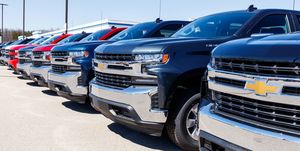- Car sales took a big hit in April of around 50 percent, so it’s no surprise that dealerships that can still sell vehicles during the pandemic are offering big deals.
- Before you rush in to buy, we recommend doing the real math and wearing a mask when you visit the dealership.
- The Consumer Financial Protection Bureau found interest in auto loans dropped way down as the pandemic spread, while people with high credit scores leading the way.
Not all automakers released sales information for April, but it appears that new-vehicle sales in the U.S. were down around 50 percent last month compared to the year before. The reason is obvious—the coronavirus pandemic—but whenever demand drops, special deals pop up to fill the void.
Zero-percent financing, job-loss assurance programs that can defer a few months of payments, and “What will the world look like then?” loans that last up to seven years have all managed to juice some sales—especially sales of pickup trucks. The deals were specifically targeted toward that lucrative segment and helped trucks outsell sedans by around 17,000 units last month.
The combination of zero-percent financing and long loans may seem like a compelling reason to go out and snatch a new vehicle now, but there are plenty of reasons not to take advantage of the headline-grabbing deals right now. The good news is that if you do need a new car, there are as many ways to be smart about financing a vehicle as there are deals to be had.
Being smart means understanding all of the details of an all-caps ZERO DOWN, ZERO PERCENT deal. Automotive News, for example, points out that deferring the first few payments works well for people who plan on keeping their new vehicle for eight to 10 years, but for those who plan on trading in their car after 36 or 48 months, a few months’ deferral can put a dent in the equity they would have otherwise built up, which means they could owe more when the time comes to trade up.
Zero-percent financing has proven to be extremely popular during the pandemic. Data from Edmunds shows that zero-percent deals made up almost 26 percent of all financed purchases in April. This is up from less than 5 percent in March and less than 4 percent in February. But, while a zero-percent loan that stretches out for seven years might seem like a way to get free money, it could just as easily get you to buy a more expensive vehicle than would be financially prudent.
It appears people who know how to handle their credit score understand that these offers might be too good to be true. The Consumer Financial Protection Bureau (CFPB) recently released an analysis of consumer behavior for March, when the first stay-at-home orders started taking effect in the U.S. Unsurprisingly, we’re acting differently than we did before COVID-19 hit. Compared to data from 2013 through 2019, in March 2020 auto loan inquiries dropped by 52 percent between the first and last week of the month. The CFPB—again, unsurprisingly—found a strong negative correlation between a drop in auto loans and the number of COVID-19 cases in any given state. In other words, the CFPB says, “States with a higher case rate experienced a larger drop in auto loan . . . inquiries.” The CFPB found a similar correlation with unemployment insurance claims.
But even though COVID-19 is currently killing demand wherever it is found, not everyone is reducing their auto loan inquiries in the same manner. In short, people with good credit ratings are less interested in starting a new auto loan during the pandemic than people with low credit scores. The CFPB’s data shows that people with low credit scores (here defined as deep subprime, or a credit score below 500, and subprime, which is between 500 and 600) saw about a 50 percent drop in inquiries from the first to the last of the month. But people with higher credit scores (a super-prime rating, or over 780) instead saw a 67 percent drop. This doesn’t mean people with higher credit scores aren’t buying new cars right now (the CFPB report doesn’t get into this), just that they aren’t as interested in new loans during the pandemic as people with lower scores. Just saying.
This content is imported from {embed-name}. You may be able to find the same content in another format, or you may be able to find more information, at their web site.
Source: Motor - aranddriver.com





